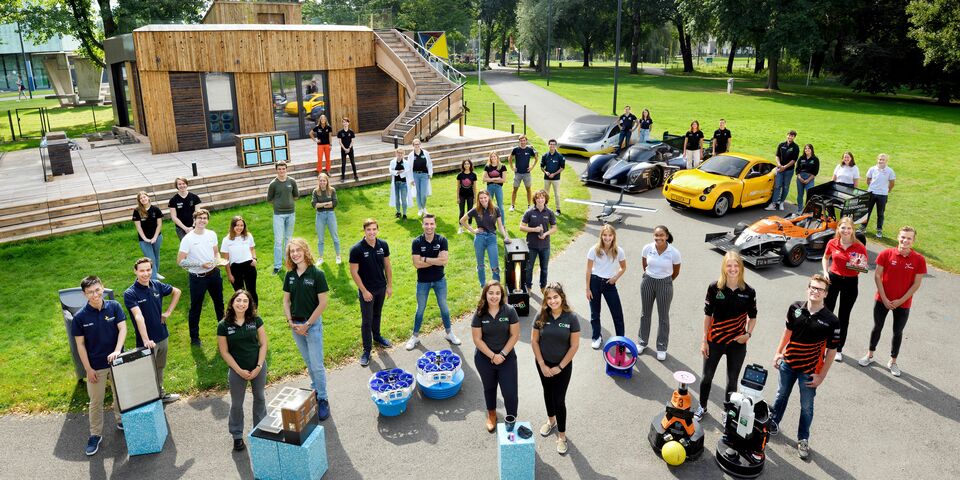Slow-progress penalty causing doubts joining student team
It’s getting harder and harder to recruit new members (and board members) for student teams. The impending slow-progress penalty is already causing uncertainty about future recruitment with the teams. The high costs of studying and living also play a role in this.
In a survey by Cursor, a number of student teams indicate that it has become more difficult in recent years to recruit new members (and board members). Full-time positions in particular have become harder to fill, which is why boards are increasingly made up of part-timers. There’s also a shortage of students for non-technical positions. For the moment, this is not putting the continuity of the teams at risk, although it’s uncertain whether it will stay this way in future.
The teams also give reasons for the more difficult recruitment of new members. The high costs of studying and living are frequently mentioned. Student teams also indicate they’re afraid the impending slow-progress penalty will result in fewer new members. Some teams say that the shortage of non-technical members hampers their marketing efforts, which in turn impacts team visibility and future recruitment.
Slow-progress penalty cause for concern
Although the slow-progress penalty hasn’t been introduced yet, it does lead to concerns about future recruitment. “I don’t know if I would’ve joined iGEM if the slow-progress penalty had already been in place at the time. Which would’ve been a pity, as the project has taught me a lot,” writes Luna Rašković.
IGNITE team manager Ivy van Dongen: “We’ve noticed that the news about the possible introduction of the slow-progress penalty hasn’t worked in our favor with people who are doubting about doing an administrative officer year, especially a full-time one. And it’s even worse if they’ve incurred study delays before… The fear of the repercussions of the slow-progress penalty being introduced in the short term is sufficient for the doubters to decide not to do it, despite knowing what it could mean to them in terms of their personal/professional development, network, and resume.”
Place of privilege
Another reason for the more difficult recruitment of new members, according to a number of teams, is the fact that the cost of living has increased. “If you don’t study for half a year, but you continue to pay full tuition, you can only do so from a place of privilege,” Luna Rašković of iGEM indicates. “One of my team members was only able to join because the basic student grant was reintroduced.”
Full-time members of student teams received financial compensation in the past two academic years. Last year, this amounted to 2,300 euros. There are plans to grant compensation again this year.
Future looming
Madis Talmar, program manager for the student teams, recognizes the misgivings about the slow-progress penalty. “When the coalition sketched the broad framework of the slow-progress penalty, the devil was really in the details. Because there weren’t any.” According to Talmar, this started ‘haunting’ student’s minds. “They started foreseeing problems in the future. In a manner of speaking, they are forfeiting their future freedom because they don’t want to be punished at the end of their studies.”
This isn’t just the students’ loss, says Talmar. It could also impact the connection with partners from the region and the university’s culture. “Many of the activities on campus are created by students, for students. My hypothesis is that this will also decline. I really hope the politicians in The Hague will make a few exceptions.”
Shortage of non-technical students
One of the other problems mentioned by the student teams is the shortage of non-technical students, who take care of HR, business, or marketing aspects. “This has been a challenge for SOLID year after year. In recent years, the level of these aspects within the team has decreased dramatically, which ultimately also impacts your technological development,” writes team manager Joost van der Kraan.
Team Daedalus also says that recruiting new members is trickier than in previous years, although this doesn’t affect the team’s functioning. Team iGEM indicates it didn’t manage to recruit extra people at the beginning of last year, but two new students did join at a later stage, which means the team isn’t experiencing any problems for the moment.
InMotion and Team Polar indicate they haven’t noticed a lot of difference with other years, although Raisa Vossen of InMotion does add the following: “We do have fewer electrical engineers than we would actually need to carry out all of the activities.”
Not just student teams
That recruiting new members is getting more difficult isn’t a new thing. This trend already started a few years ago. However, it’s not just the student teams that are confronted with declining interest, as revealed by questions of student party DAS (De Ambitieuze Student; The Ambitious Student) in the final University Council meeting before the holiday. The party said it was getting more difficult to find new members (and board members) for all student organizations at the university. The prospect of the slow-progress penalty will only make this more difficult, the party fears.
The university shares these concerns and is aiming for those engaging in extracurricular activities to be exempted from the penalty, but this still needs to be discussed with the minister and umbrella organization Universities of the Netherlands.


Discussion